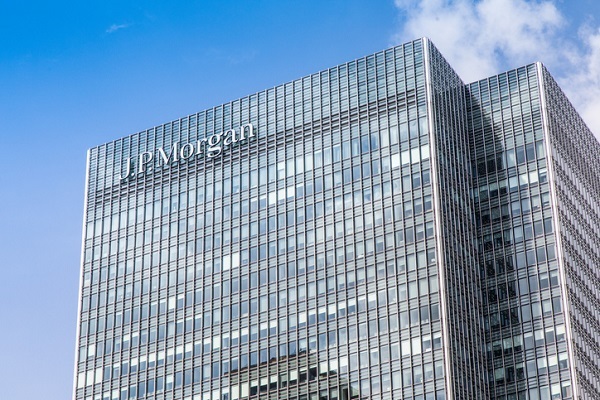ii view: JP Morgan stock hits year low as Q1 earnings slump
13th April 2022 15:45
by Keith Bowman from interactive investor
Shares for this major US banking group have fallen by more than 15% in 2022. Buy, sell, or hold?

First-quarter results to the 31 March
- Revenue down 5% $30.72 billion
- Net income down 42% to $8.28 billion
- Earnings per share down 42% to $2.63
Chief executive Jamie Dimon said:
“We remain optimistic on the economy, at least for the short term – consumer and business balance sheets as well as consumer spending remain at healthy levels – but see significant geopolitical and economic challenges ahead due to high inflation, supply chain issues and the war in Ukraine.”
“Our focus this quarter remained on helping our clients navigate difficult markets and unpredictable events, which included working with governments to implement economic sanctions of unprecedented complexity. While our company will continue to deal with this global turmoil, our hearts go out to the extreme suffering of the Ukrainian people and to all of those affected by the war.”
ii round-up:
US banking giant JPMorgan Chase (NYSE:JPM) today reported a fall in first-quarter earnings year-over-year, impacted by both credit provisions because of the more uncertain economic outlook and write-offs in relation to Russia and Ukraine.
Earnings per share fell to $2.63 from $4.50 in the first quarter of 2021, with both a $902 million bad debt provision and $524 million of losses relating to Russia taking some $0.36 per share off earnings.
JP Morgan shares retreated by around 1% in pre-market US trading, having already fallen by over 15% year-to-date. Investors have fretted over both elevated inflation and its impact on the economic outlook and the bank’s exposure to Russia. Shares for US rival Citigroup (NYSE:C) and the tech-heavy and interest rate sensitive Nasdaq Composite index are down by a similar amount in 2022.
- Q1 US earnings season preview: banks to set downbeat tone
- Chart of the week: latest share price forecast for Lloyds Bank
- Tips for recession-proofing a portfolio: where to start?
Profit for JP Morgan’s corporate and investment banking division fell by 26% to $4.4 billion as investment banking fees fell by almost a third, given reduced equity and debt underwriting activity. Sales for its Markets related business retreated 3% from a record first quarter last year. Revenue for the division overall fell 7% to $13.5 billion, with expenses climbing 3%.
At its more traditional banking business, profit fell 57% to $2.9 billion, largely reflecting the absence of any pandemic related credit writebacks, as made every quarter during 2021. Growth in deposits added to a one-fifth increase in combined debit and credit card spending, helping overall divisional revenue to fall by just 2% to $12.2 billion. Auto loans rose 3%, although the lack of vehicle supply continued to impact originations which fell 25%.
Assets under management for its wealth division rose 4% to $3 trillion, helped by higher net fund inflows.
The New York headquartered bank previously declared a first-quarter dividend of $1 per share, in line with the previous quarter. The bank also bought back $1.7 billion of its own stock over the period, down from $1.9 billion in the final quarter of 2021.
ii view:
JP Morgan operates across both traditional consumer and corporate banking, along with investment banking and asset management. North America generates around three quarters of its revenues, leaving it as something of a bellwether for the US economy, followed by Europe, the Middle East and Africa at around 15% and Asia most of the balance.
For investors, challenges caused by Russia’s invasion of Ukraine have hurt. Elevated inflation has left management’s outlook comments more cautious in tone, with concern that the US central bank could now increase interest rates too high or too fast and tip the US economy into a downturn. Heightened geopolitical tensions and dampened investor sentiment have also hit business at its investment bank.
- How high could US interest rates really go?
- Top 10 things you need to know about investing in the US
- Want to buy and sell international shares? It’s easy to do. Here’s how
Against that, rising interest rates can be beneficial for banks, increasing their ability to widen the margin between deposit and lending rates. The benefits of a diversified business model covering both traditional and investment banking should not be forgotten, while a forecast dividend yield of just over 3% is not derisory in an era of still low rates by historical standards. In all, while some caution looks sensible, long-term fans of the bank are likely to remain patient.
Positives:
- Business diversity
- Investing in technology
Negatives:
- Economic outlook uncertainty
- Rising costs
The average rating of stock market analysts:
Buy
These articles are provided for information purposes only. Occasionally, an opinion about whether to buy or sell a specific investment may be provided by third parties. The content is not intended to be a personal recommendation to buy or sell any financial instrument or product, or to adopt any investment strategy as it is not provided based on an assessment of your investing knowledge and experience, your financial situation or your investment objectives. The value of your investments, and the income derived from them, may go down as well as up. You may not get back all the money that you invest. The investments referred to in this article may not be suitable for all investors, and if in doubt, an investor should seek advice from a qualified investment adviser.
Full performance can be found on the company or index summary page on the interactive investor website. Simply click on the company's or index name highlighted in the article.